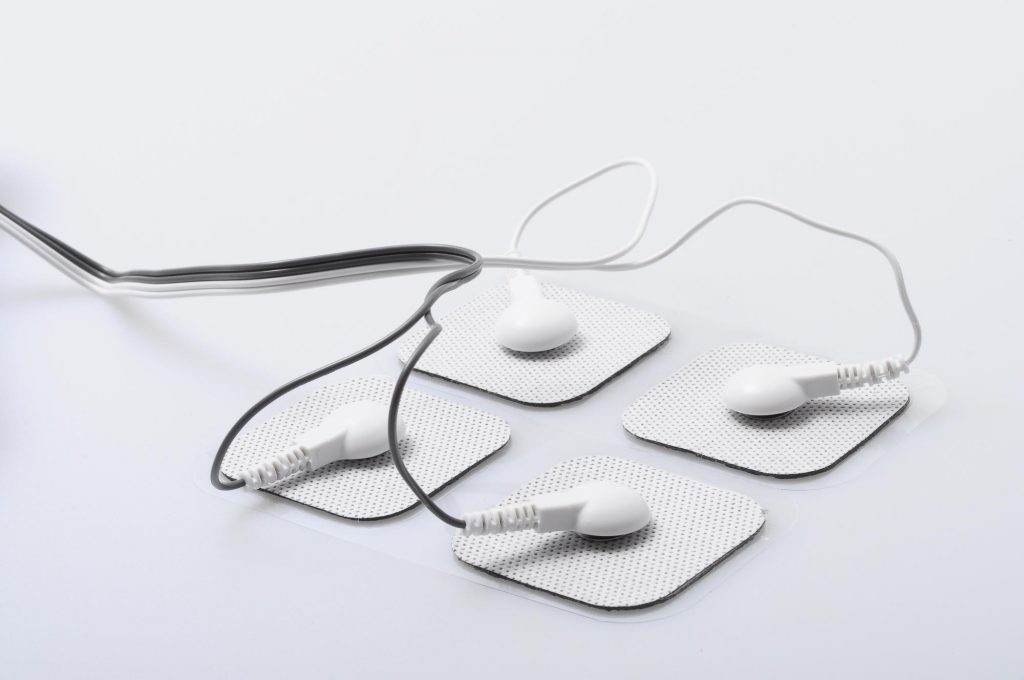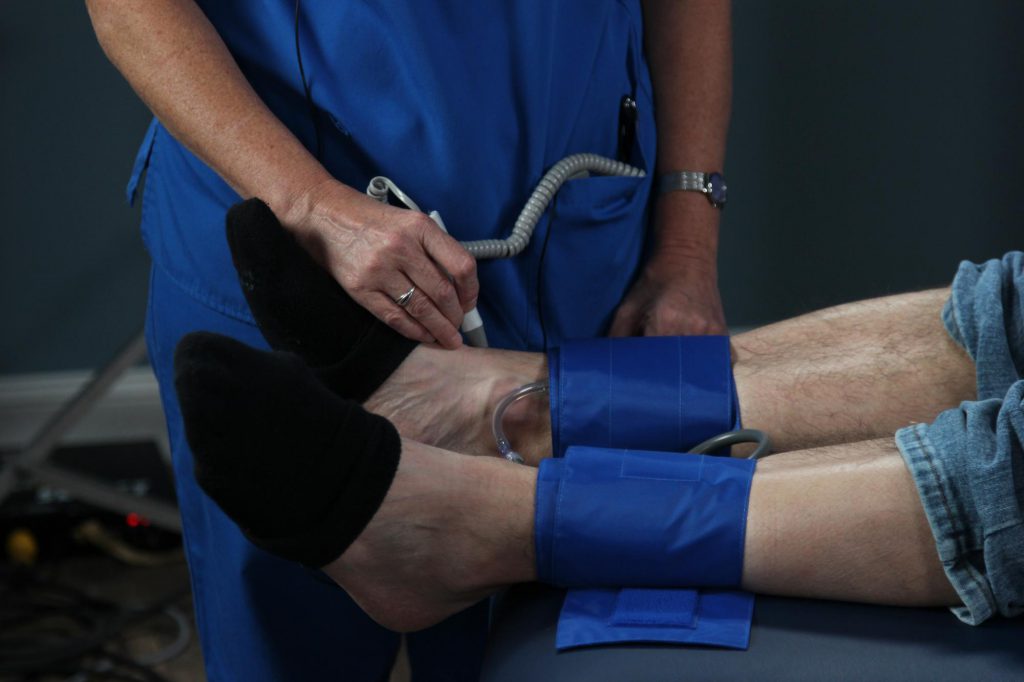Carotid Artery Disease Screening
The carotid artery is the major blood vessel that runs up the neck and to the brain. If it becomes blocked with a clot or arterial plaque the result is a potentially deadly stroke.
Our technicians use an ultrasound machine to scan the carotid artery and to check for any plaque buildup in this critical area.
The carotid artery is just one indicator of overall cardiovascular health. That’s why we perform this screening as a part of our 4-Part Health Screening Package. Done together, these five screenings give us a much more complete picture of your health.
What is Carotid Artery Disease?
Carotid artery disease is also known as carotid stenosis. It occurs when plaque builds up in the carotid arteries. You have two carotid arteries, one on each side of the neck, which carry blood to the brain. Plaque is made up of cholesterol, calcium, and other cellular substances and it can collect in the arteries, making the arteries stiffer and narrower. This is defined as carotid artery disease, which is a form of atherosclerosis. Clogged arteries do not deliver blood and oxygen as well as they should to the brain. Carotid artery disease develops slowly over time as people age, and most people have no symptoms. In fact, for 4 out of 5 people who have a stroke, the first symptom they experience is the stroke.
People who have carotid artery disease, which is a form of atherosclerosis, can often have plaque buildup in arteries in other parts of the body as well. Carotid artery disease is a major risk factor for strokes because plaque can either break off and travel to the brain, or it can block blood flow to the brain, resulting in a stroke that could cause permanent brain damage or death
What is Carotid Artery Disease Screening?
The best way to check for carotid artery disease is to undergo a screening. Carotid artery screening is conducted via a non-invasive color flow ultrasound in which a technician creates a series of images of the carotid arteries while also measuring blood flow through them. After a board-certified physician reviews your results from the screening, the results letter will indicate the degree of plaque buildup for each of your two arteries on a scale of normal (no plaque identified and blood flow is normal) to significant (large amount of plaque identified, and blood flow is significantly reduced).
This allows people with normal, mild, or moderate carotid artery blockage to compare the results of each screening to previous screening results, determining if the plaque buildup has gotten worse. Plaque buildup can be progressive without treatment, getting worse over time. Early identification of risk, before symptoms are present, allow you and your doctor to take action if necessary. Plaque buildup (atherosclerosis) can occur in any of the arteries in the body. This is one reason the simple ultrasound of the carotid arteries is so valuable: it helps people understand their risk of developing atherosclerosis in other areas of the body as well.
Physicians who are on the front lines of vascular disease believe in these tests—9 out of 10 cardiovascular doctors support preventive health screenings for cardiovascular disease among people with key risk factors.
What Happens After My Carotid Artery Disease Screening?
If the screening report identifies the buildup of plaque in your carotid arteries, schedule an appointment with your doctor to review the results. Your doctor may order additional tests to confirm a diagnosis of carotid artery disease.
Depending on the severity of disease, treatment can include changes to your lifestyle, such as reducing the amount of saturated fat and sodium in your diet, exercising regularly, and monitoring your blood pressure and cholesterol levels. Your doctor may also prescribe blood thinners or other medications to prevent the blood from clotting.
In cases of severe disease, or if treatment is ineffective, you may need to undergo a surgical procedure called a carotid endarterectomy. This procedure removes the plaque from the arteries to restore normal blood flow and reduce the likelihood of a stroke. Receiving a screening before you experience symptoms helps reduce the chances that surgery will be necessary by detecting disease before a 50% blockage develops.
If your doctor determines that a carotid endarterectomy is not appropriate for you, carotid angioplasty and stenting is often recommended as an alternative. The minimally-invasive procedure can typically be performed on an outpatient basis. The doctor will first perform an angioplasty, in which a balloon is inserted into the narrowed artery. The balloon is then inflated to widen the artery. A metal-mesh tube, known as a stent, is inserted to keep the artery open after the procedure is complete.
How is the Screening Performed?
The non-invasive ultrasound screening for carotid artery plaque is painless and does not require the removal of any clothing. While you recline on your back, the technician applies a clear gel to your skin. The gel reduces the interference from surrounding air that could affect the clarity of the image produced by the transducer. The technician moves the transducer over your skin to capture a series of images. After the exam is complete, the gel is easily removed and leaves no marks on your skin.
What are the warning signs of carotid artery disease?
Carotid artery disease is often a silent disease, developing without causing any pain, discomfort, or other symptoms. If plaque buildup goes unnoticed until it is seriously impacting blood flow to the brain, it can cause a stroke. Early screening can help identify the problem before it is too late, especially in people with risk factors for cardiovascular disease.
The warning signs of a stroke are:
- Sudden numbness or weakness in arms or legs, which may only be present on one side of the body
- Facial drooping, which can affect only one side of the face
- Sudden difficulty talking
- Dizziness
- Severe headache
- Sudden trouble seeing
What causes carotid artery disease?
Certain risk factors increase your risk of developing cardiovascular disease and carotid artery disease. The contributing factors are:
- Age 55+
- Family history of cardiovascular disease, heart disease, or stroke
- Smoking (past or present)
- High Blood Pressure
- Diabetes
- High Cholesterol
- Obesity
Who should get a carotid artery screening?
A carotid artery ultrasound is appropriate for all adults age 55+, and adults age 40+ with two or more risk factors for cardiovascular disease. Many people age 40+ wish to undergo an initial screening as part of an overall wellness program. Discuss your risk factors with your doctor to determine if screening is right for you.
Ages
Carotid artery disease screening is appropriate for all adults age 55+. It is also appropriate for adults age 40+ who have risk factors for cardiovascular disease, and who want to be proactive about their health.
Frequency
Annual screening is recommended for anyone with risk factors for cardiovascular disease, or who has previously undergone a screening that identified the presence of plaque in the arteries.
What are the Benefits of Screening?
- Preventive screening can identify plaque buildup in the carotid artery before symptoms appear
- Your doctor can review the results and recommend changes to your lifestyle to reduce your risk of cardiovascular disease
- If you are found to have a moderate artery blockage, additional tests can be ordered
- Early treatment can prevent serious symptoms of cardiovascular disease later
What are the Risk Factors of Screening?
- Ultrasound screening carries no known risks to health
- Skin irritation from the gel is rare, but can occur due to allergic contact dermatitis
Relevant Tests
1Seshadri S, Beiser A, Kelly-Hayes M, et al., The Lifetime Risk of Stroke: Estimates from the Framingham Study. Stroke, 2006; 37:345-350.
2Key risk factors include diabetes, obesity, age 55+, smoking (past or present), high blood pressure, high cholesterol, and a family history of stroke or heart disease.


